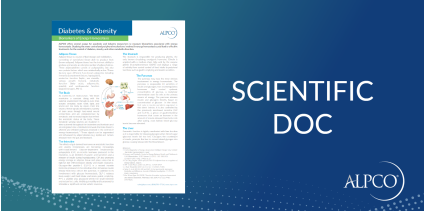Diabetes and Obesity Solutions
Diabetes and obesity are complex conditions related to physiological imbalances. Researchers study many hormones to explore how pancreatic islet cell function, paracrine signaling, and energy homeostasis interplay in metabolic disorders. ALPCO’s portfolio of assays are optimized for range, sensitivity, sample type, and time. Leverage multiple formats – colorimetric or chemiluminescent ELISA, RIA – for manual or automated workflows.
-
 April 20, 2023
April 20, 2023Incretins GIP and GLP-1 in Diabetes and Obesity
800 million people worldwide struggle with obesity, a disease which will cost over $1 trillion in medical consequences by 2025. The CDC reports that severe obesity leads to life-altering and often life-threatening conditions like heart disease, stroke, type 2 diabetes, and certain cancers. What is the “Incretin Effect”? To help understand the mechanisms behind obesity and to develop trea... -
 April 21, 2023
April 21, 2023Diabetes and Obesity
Diabetes and Obesity Learning Library! As a leading provider of testing solutions for the diabetes and obesity research community, we support scientists’ efforts to gain a greater understanding of these conditions. With no cure for type 1 or type 2 diabetes and a lack of effective obesity treatments, scientists in these fields are continually in need of new methods to advance their studies. As... -
 November 9, 2021
November 9, 2021Insulin Resistance: Root Causes, Detection, and Prevention
The Diabetes Pandemic According to the U.S. Centers for Disease Control (CDC) and the World Health Organization, more than 34 million Americans and 422 million people worldwide have diabetes.1,2 90 to 95% of people with diabetes have type 2.1 The National Institute of Diabetes and Digestive and Kidney Diseases (NIDDK) estimates that more than 1 in 3 U.S. adults (~84 million) have prediabetes...
Explore all of our diabetes and obesity research
Products for Diabetes & Obesity
-
 ALEX² Allergy Explorer Kit (50 tests)
ALEX² Allergy Explorer Kit (50 tests)Catalog #: 87-02-5001-02
Sample Types: Citrate Plasma, Heparin Plasma, Serum
Sample Size(s): 50 Tests


